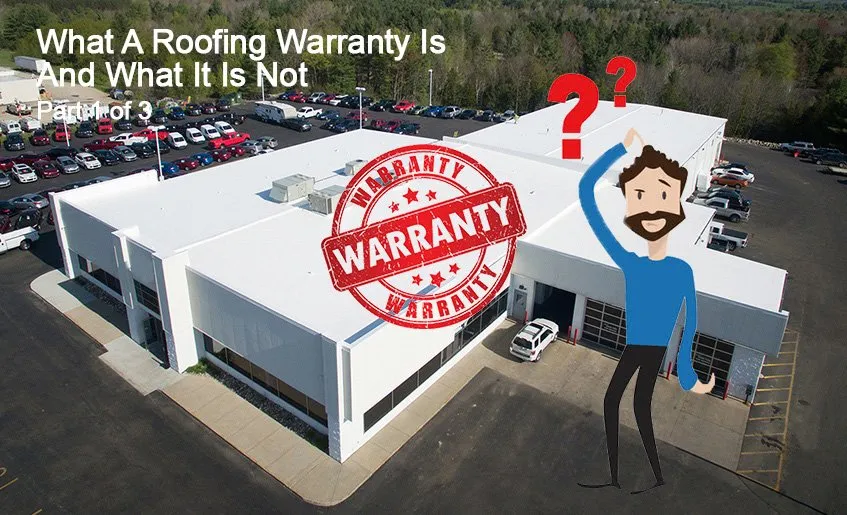WHAT A ROOFING WARRANTY IS AND WHAT IT IS NOT – PART 1 OF 3
Roofing warranties are used to give building owners peace of mind, but are they a must have? Many building owners find themselves asking if a roofing warranty is really necessary and what, if anything, it provides. It is important for any property owner or manager to understand roofing warranties so they can evaluate for themselves if they are worth it or not. The first thing to understand is that there are two types of warranty; express and implied.
Express Warranty
An express warranty comes with buying the roofing system. It provides the term and length of the warranty. This warranty is a written contract between the building owner and manufacturer or contractor that lays out the limits, liabilities, and responsibilities of the warranty holder. This is not a guarantee that you won’t get leaks, but in the event of any roof failure, the express warranty provides the possible actions of the manufacturer or contractor to remedy the situation.
Implied Warranty
The implied warranty is the more fundamental one you need to pay attention to. This warranty must be provided by a manufacturer and implies that the product is fit for its intended use. The implied warranty only covers proper use of the item as intended. For roofing, this warranty means that the materials can be used for roofing and they will keep a building dry and safe as stated by manufacturer guidelines and provided they are installed properly. When applied and used correctly, the warranty implies the roofing will work as intended.
Who Provides Warranties?
The entities that may provide a roofing warranty are the manufacturer and the contractor. Contractor warranties typically cover repairs if any leak problems occur. Should the contractor go out of business, the warranty will no longer be valid, because the only assets that back up a contractor warranty are those that they have. Choose a reliable and solid contractor to avoid this issue.
Some contractors will have certain clauses in place for their warranties. For example, many will only honor a warranty if they are hired to perform the work within the warranty period. You can get around this by hiring a contractor to handle inspections and repairs, and a roofing architect to provide the maintenance. This way you will only pay for the work required at that specific time.
Manufacturer warranties are a little different. These cover either materials or labor, or both. When only materials are covered, there is only a violation if the provided materials fail to fit the standards of intended use. Materials-only warranties can also override implied warranties, so make sure you read the paperwork carefully so you know your rights.
Some manufacturers will offer pro-rated warranties. With these, the money payable for work done will depend on how long the warranty has been active. In other words, the longer you have had the roof, the less money you have available for repairs if the roofing fails. Manufacturers will advise that since you have had the warranty for so long, it should have been used earlier. So, it is important to read through warranties carefully, so you don’t get stuck paying out of pocket.
There are other warranties that place limits on the amount of money that can be applied to a roof replacement. With inflation and price increases, this can mean there is not enough money to cover the work. You may also see a “no dollar limit” (NDL) warranty option from the manufacturer, which means that the warranty is not pro-rated or limited. The manufacturer will cover the costs in full if they are found to be liable for the failure.
To be continued…

